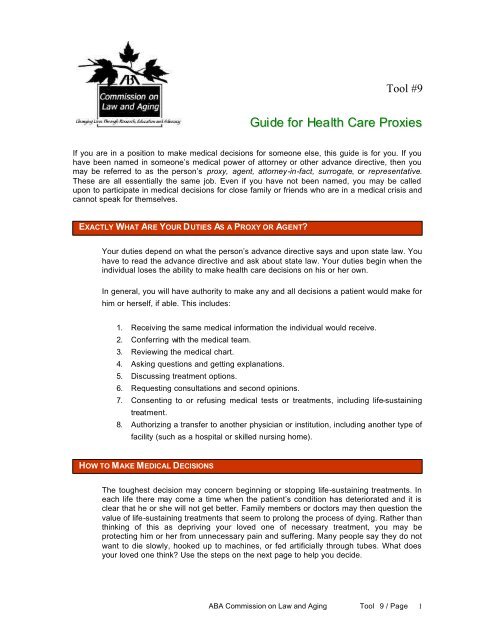Consumer's Tool Kit for Health Care Advance Planning
Consumer's Tool Kit for Health Care Advance Planning
Consumer's Tool Kit for Health Care Advance Planning
Create successful ePaper yourself
Turn your PDF publications into a flip-book with our unique Google optimized e-Paper software.
<strong>Tool</strong> #9<br />
Guide <strong>for</strong> <strong>Health</strong> <strong>Care</strong> Proxies<br />
If you are in a position to make medical decisions <strong>for</strong> someone else, this guide is <strong>for</strong> you. If you<br />
have been named in someone’s medical power of attorney or other advance directive, then you<br />
may be referred to as the person’s proxy, agent, attorney-in-fact, surrogate, or representative.<br />
These are all essentially the same job. Even if you have not been named, you may be called<br />
upon to participate in medical decisions <strong>for</strong> close family or friends who are in a medical crisis and<br />
cannot speak <strong>for</strong> themselves.<br />
EXACTLY WHAT ARE YOUR DUTIES AS A PROXY OR AGENT?<br />
Your duties depend on what the person’s advance directive says and upon state law. You<br />
have to read the advance directive and ask about state law. Your duties begin when the<br />
individual loses the ability to make health care decisions on his or her own.<br />
In general, you will have authority to make any and all decisions a patient would make <strong>for</strong><br />
him or herself, if able. This includes:<br />
1. Receiving the same medical in<strong>for</strong>mation the individual would receive.<br />
2. Conferring with the medical team.<br />
3. Reviewing the medical chart.<br />
4. Asking questions and getting explanations.<br />
5. Discussing treatment options.<br />
6. Requesting consultations and second opinions.<br />
7. Consenting to or refusing medical tests or treatments, including life-sustaining<br />
treatment.<br />
8. Authorizing a transfer to another physician or institution, including another type of<br />
facility (such as a hospital or skilled nursing home).<br />
HOW TO MAKE MEDICAL DECISIONS<br />
The toughest decision may concern beginning or stopping life-sustaining treatments. In<br />
each life there may come a time when the patient’s condition has deteriorated and it is<br />
clear that he or she will not get better. Family members or doctors may then question the<br />
value of life-sustaining treatments that seem to prolong the process of dying. Rather than<br />
thinking of this as depriving your loved one of necessary treatment, you may be<br />
protecting him or her from unnecessary pain and suffering. Many people say they do not<br />
want to die slowly, hooked up to machines, or fed artificially through tubes. What does<br />
your loved one think? Use the steps on the next page to help you decide.<br />
ABA Commission on Law and Aging <strong>Tool</strong> 9 / Page 1
















